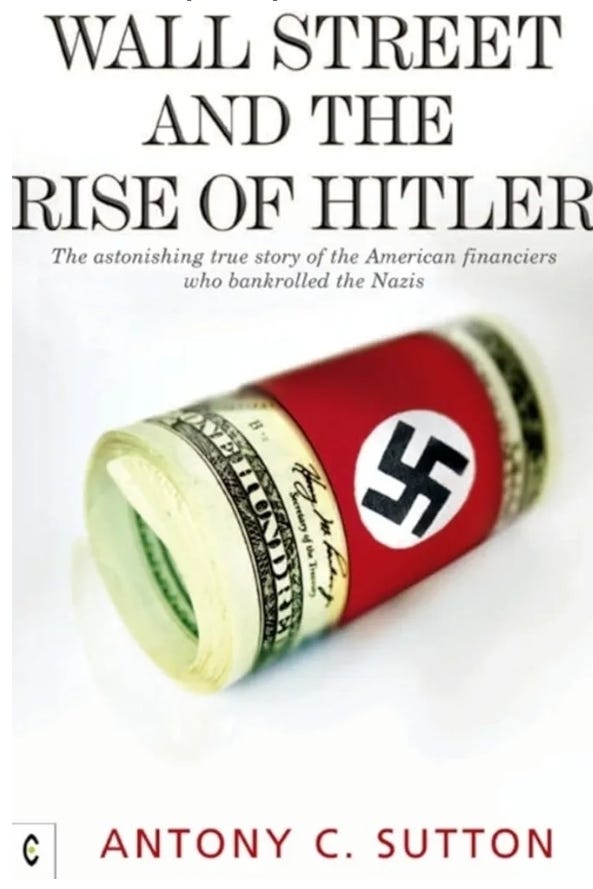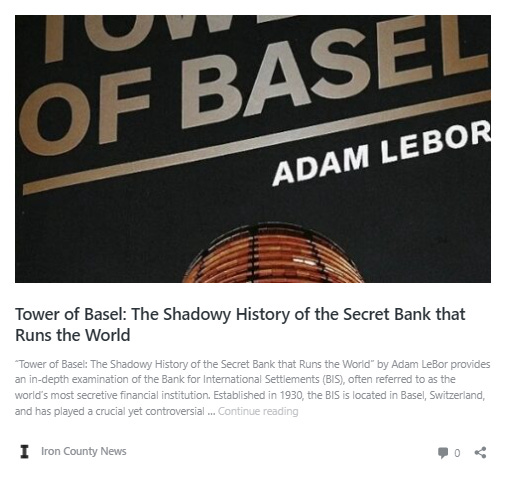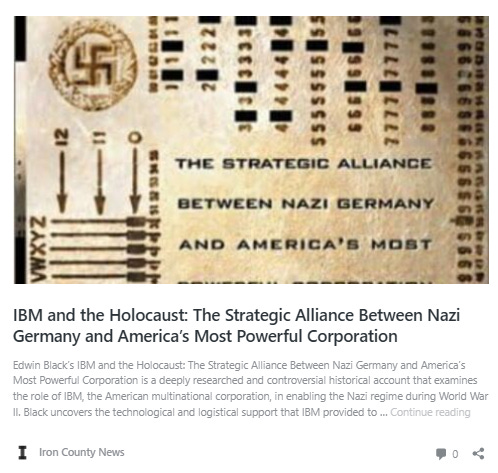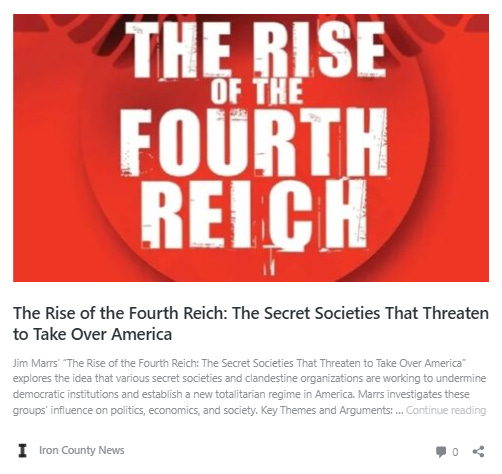Wall Street and the Rise of Hitler
Antony C. Sutton’s Wall Street and the Rise of Hitler is a controversial and meticulously researched work that explores the relationship between American industrialists and financiers with Nazi German
Antony C. Sutton’s Wall Street and the Rise of Hitler is a controversial and meticulously researched work that explores the relationship between American industrialists and financiers with Nazi Germany, particularly how certain Wall Street figures and American corporations played a significant role in Adolf Hitler’s rise to power. Sutton delves into the connections between major U.S. corporations and the Nazi regime, arguing that these relationships helped fund and equip the Nazis, contributing to the outbreak of World War II.
The Deep State: The Fall of the Constitution and the Rise of a Shadow Government
World War 3 Isn’t What You Think; It is the Globalists vs the Rest of Us
Here are the key points Sutton makes in the book:
U.S. Financial Support for Nazi Germany
Sutton argues that U.S. banks and financial institutions, particularly those based on Wall Street, provided significant loans and financial backing to Nazi Germany during the 1920s and 1930s. This financial support helped Germany recover from the hyperinflation of the early 1920s and reestablish its industrial base.
Prominent financial institutions such as the Union Banking Corporation and the Bank for International Settlements were involved in financing German businesses that would later become critical to the Nazi war machine.
Corporate Ties to Nazi Germany
Sutton highlights how several major U.S. corporations had deep ties to Nazi Germany. He provides detailed evidence that companies such as General Motors, Ford, IBM, Standard Oil, and ITT not only had business dealings with Germany but also contributed directly to the Nazi regime’s industrial and military capabilities.
For example, Sutton claims that Ford had factories in Germany that were producing military vehicles for the Nazis, and General Motors subsidiaries were involved in the manufacture of tanks and aircraft for the German war effort.
Standard Oil, one of the largest U.S. oil companies at the time, had arrangements with I.G. Farben, a key German chemical company that played a central role in the Nazi war effort, providing the fuel and synthetic materials necessary for the German military.
The Role of the Bank for International Settlements (BIS)
Sutton focuses on the Bank for International Settlements (BIS), an international financial institution based in Switzerland, as a key player in funneling money to the Nazi regime. The BIS was ostensibly neutral, but Sutton argues that it was used as a tool by American and European bankers to finance the Nazi war machine.
He details how the BIS facilitated transactions between the U.S. and Germany, helping the Nazis purchase critical supplies and manage financial operations, even during World War II.
Hitler’s Rise and the Support of American Industrialists
Sutton traces the early financial support that Adolf Hitler received from American industrialists. He argues that while Hitler’s political rhetoric was anti-capitalist, his movement was heavily dependent on the financial backing of international capitalists. Some of the financial elites saw an opportunity in supporting Hitler’s regime, believing that a strong Germany would serve as a buffer against the spread of communism in Europe.
Among the industrialists Sutton identifies are Prescott Bush (father of President George H.W. Bush), who was involved with companies that provided financial support to Germany through the Thyssen family, a key Nazi ally and industrialist group.
Technology Transfers and Industrial Cooperation
Sutton details how American companies shared critical technology with Nazi Germany, aiding its ability to rearm and modernize its industrial base. IBM famously supplied the Nazis with the technology necessary to track and manage populations, including the administration of concentration camps through its punch card systems.
ITT, a major U.S. telecommunications company, had close ties with the Nazi regime, providing technology that improved Germany’s wartime communication infrastructure. Sutton suggests that without these American technological contributions, the Nazi war effort would have been less effective.
Moral Complicity of American Corporations
One of the most controversial aspects of Sutton’s work is his assertion that many American corporations and financial elites knowingly profited from Nazi Germany’s aggression and war efforts, despite the clear moral implications. Sutton argues that corporate greed and the pursuit of profit motivated these interactions, even as it became clear that the Nazis were committing atrocities.
He further argues that these business dealings did not cease after the U.S. entered World War II. Certain companies continued to engage in covert or indirect support for the Nazis, often through subsidiaries based in neutral countries like Switzerland or Sweden.
The Influence of Wall Street on U.S. Foreign Policy
Sutton suggests that the same financial interests that supported Hitler also had significant influence over U.S. foreign policy. He argues that many of the decisions made by the U.S. government in the lead-up to World War II were influenced by the same Wall Street interests that had financially backed Nazi Germany.
He also explores the broader idea that Wall Street sought to maintain a balance of power in Europe, and that supporting Germany was part of a strategy to counterbalance the Soviet Union.
The Hypocrisy of Anti-Fascism
One of Sutton’s more provocative claims is that while Roosevelt’s government presented itself as strongly anti-fascist, elements within the U.S. elite were still profiting from the Nazi regime. He criticizes what he sees as hypocrisy on the part of these elites, who publicly supported democracy and fought fascism but privately enabled the rise of the Nazi regime through financial and industrial cooperation.
Impact on Post-War World
Sutton argues that the consequences of this financial support extended beyond the end of the war. Many of the same corporations and financial institutions that had supported Nazi Germany emerged from the war unscathed and continued to dominate global markets. He suggests that their influence on the post-war world helped shape the global capitalist order, and many of the individuals involved in these dealings were never held accountable.
In Wall Street and the Rise of Hitler, Antony C. Sutton presents a stark, deeply researched argument that American financial and industrial elites were complicit in the rise of Nazi Germany. He documents numerous instances where U.S. corporations and bankers not only conducted business with the Nazis but also played a critical role in helping the regime rearm and prepare for war. Sutton’s work challenges the commonly held belief that the U.S. business community was uniformly opposed to Hitler and reveals the complex, and often troubling, ties between American capitalism and the Nazi regime.
Happy Holidays from the Art of Liberty Foundation!
We Goofed! Our discount code for 20% didn’t work on December 8th so we are extending the 20% discount until midnight on Thursday, December 12th!
Celebrate the season with special discounts:
20% off from December 5th-12th with the code Liberty20
15% off from December 13th-16th with the code Liberty15
10% off from December 17th until Christmas with the code Liberty10
Shop for unique books and gifts now at Government-Scam.com/store and make this holiday season extra special!










YES, TRUMP IS LIKE HITLER, BUT NOT IN THE WAYS YOU THINK
Beyond the caricatures lies a chilling blueprint: how both leaders exploited grievances, scapegoated the vulnerable, and built myths of strength to dismantle democracy.
https://open.substack.com/pub/patricemersault/p/yes-trump-is-like-hitler-but-not?r=4d7sow&utm_campaign=post&utm_medium=web